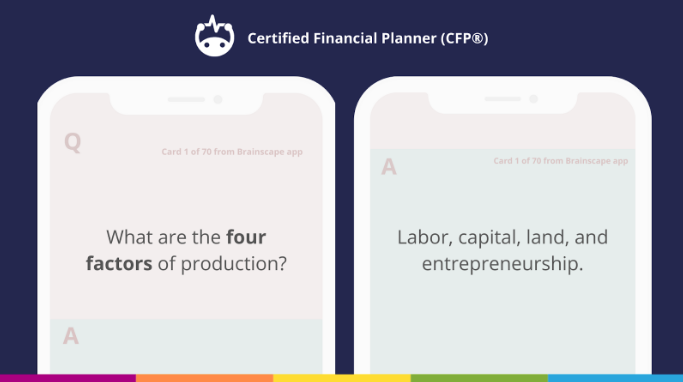So, you’ve decided to become a Certified Financial Planner (CFP®). Congrats! You’re basically signing up to become the MVP of financial wisdom—a human spreadsheet who can also tackle taxes, investments, and retirement strategies. The only thing standing between you and CFP® glory? That dastardly beast of an exam.
If you’re already working full-time and balancing a life that might occasionally require you to do other stuff like, I don’t know, sleep, Certified Financial Planner exam prep can feel like trying to stuff a watermelon into a coffee cup. But fear not! With the right approach and CFP® study materials, you can crush this test on your first try.
Let’s get to it.
TL;DR: your CFP® exam survival checklist:
- Make a study plan: Start early, stick to a schedule, and avoid cramming.
- Focus on high-yield topics: Master investment planning, taxes, and retirement strategies.
- Use digital flashcards: Brainscape’s expert-curated CFP flashcards will drill you on the content you need to know, with all of the fluff left out.
- Practice like it’s game day: Take full-length practice tests under real exam conditions.
- Conquer stress: Manage test anxiety, eat smart, and rest up before exam day.
Why is the CFP® exam such a big deal?
The Certified Financial Planner exam is a 170-question showdown that tests your knowledge of all things money, from investment planning and risk management to the psychology of financial planning—yes, even your clients' brain quirks matter now.
Passing the exam earns you the coveted CFP® designation, which is like a Michelin star for financial planners. It signals to the world that you know your stuff, you’re a trustworthy pro, and you can help clients navigate life’s financial rollercoaster without crashing the cart.
The pass rate? A nail-biting 65%. Two out of three ain’t bad, but it’s not ideal.
So how do you make sure that you pass your CFP® exam the first time?
Step 0: When are the next Certified Financial Planner exam dates?
Before you prepare for a race, you need to know what day you’re running. The Certified Financial Planner exam is held at different times in different countries. For example in Australia, you can sit the exam in May or September, while in the United States, you can sit the exam in March, July, or November.
For the latest information on the next CFP exam dates, always refer to the CFP's official website here.
Once you know your “deadline”, use these free exam countdown planners to schedule your studying between now and then. Speaking of which…
Step 1: Create your CFP® study plan (and actually stick to it)
Most CFP candidates are juggling full-time jobs, families, and a personal vendetta against their alarm clocks. That’s why a rock-solid study plan isn’t just helpful—it’s survival.
Here’s how you do it:
- Start early and pace yourself: This exam covers a lot of ground. Give yourself at least 3-6 months for Certified Financial Planner exam prep, and break your studying into manageable chunks. (Overachievers, resist the urge to cram.)
- Mix up your methods: Don’t just passively read the course materials like it’s your high school history textbook. Use active recall techniques such as practicing with flashcards to ensure that every minute spent studying has a high ROI!
- Test yourself (constantly): Certified Financial Planner exam questions are essential to CFP® exam success. Treat them like your new favorite hobby. When you finish a practice test, don’t just admire what you got right: scrutinize every wrong answer to identify your weaknesses!
Step 2: Focus on high-yield CFP® topics (don’t get distracted)
The CFP® exam isn’t all that interested in your encyclopedic knowledge of obscure tax codes. It’s about mastering the most testable concepts and applying them to real-world scenarios.
The key CFP® exam topics include:
- Investment planning: Nerd out on stocks, bonds, and portfolios.
- Tax planning: You’re the person who stands between the IRS and your client’s sanity.
- Retirement planning: Because nobody wants to keep applying for jobs at age 80.
- Risk management: Insurance, insurance, insurance—did we mention insurance?
- Estate planning: Will your clients leave a legacy or a legal mess?
And new on the block: the Psychology of Financial Planning. Yes, you’re now part therapist, part money guru.
The good news is that you don’t have to spend hours slogging through dense course materials trying to guess at what the Certified Financial Planner exam will test you on. Brainscape’s CFP flashcards distill all the content from top test prep resources—like the official CFP® curriculum, Brett Danko, Kaplan, BIFF, and Wiley—into 1,340+ adaptive flashcards. No guesswork. No wasted time. Just the highest-yield concepts you need to study efficiently and pass the exam the first time around.
Step 3: Conquer the mental game (because stress is inevitable)
The Certified Financial Planner® exam isn’t just about knowledge—it’s about endurance. It’s six hours long, split into two three-hour sessions. That’s the academic equivalent of running a marathon while juggling bowling pins.
Here’s how you survive the mental challenge of Certified Financial Planner exam prep:
- Take practice tests under real exam conditions: Set a timer. Avoid snacks. Sit at a desk. Train your brain to focus for the full exam length.
- Banish test anxiety: The night before the exam, don’t pull a last-minute cram session. Relax. Enjoy an activity that sets you up for a good sleep.
- Eat smart on exam day: Fuel up on protein, complex carbs, and water. Avoid sugar and caffeine overdoses unless you enjoy crashing harder than the stock market in 1929.
Check out our YouTube video on beating exam stress:
Step 4: Find your secret weapon in CFP® flashcards (the memory hack you need)

When it comes to Certified Financial Planner® exam prep, there is SO much to learn. The IRS code with all its regulations and guidance would be over 70,000 pages if you printed it out.
Memorizing CFP® exam content can feel like trying to drink from a firehose. That’s why flashcards are a lifesaver. They break massive topics into digestible bits, forcing you to actively recall key information—which, science says, is the best way to learn.
But not all flashcards are created equal. Paper flashcards take ages to sort and organize, and most digital apps still leave you the agonizing task of deciding what to study and when.
Brainscape’s CFP® Flashcards use spaced repetition to target your weak spots and reinforce what you need to know most. They give you bite-sized knowledge in perfectly timed bursts. It’s like having a personal trainer for your brain. You’ll drill the essential CFP® requirements, financial planning principles, and even those tricky tax law details without breaking a sweat.
Forget worrying about which concepts to study. We’ve got you covered. We’ve broken down all of the highest-yield concepts in the official CFP® curriculum, Brett Danko, Kaplan, BIFF, and Wiley. By spending less time worrying about what to study, you can conserve your mental energy to maximize learning. (It even makes you more likely to study!)
And the best part? You can study anywhere—on the bus, in line at the coffee shop, or hiding from your boss in the break room.
Step 5: Celebrate passing the CFP® exam (you’ve earned it)
When you finally pass the Certified Financial Planner® exam, it won’t just be a victory—it’ll be an epic triumph. You’ll officially join the ranks of elite financial planners, armed with the CFP® designation and the confidence to handle even the trickiest client situations.
Pop the champagne. Buy yourself something nice. Maybe even take a nap—you’ve earned it.
Final words of wisdom
The CFP® exam might be a beast, but it’s one you can absolutely tame. With a clear study plan, high-quality study materials, and tools like Brainscape’s smart CFP® flashcards, you’ll be ready to conquer this challenge and look cool doing it.
Stay focused, study smart, and remember: you’ve got this.
Now go out there and show the CFP® exam who’s boss.
Sources
- About the CFP exam. About the CFP Exam | CFP Board. (n.d.). https://www.cfp.net/get-certified/certification-process/exam-requirement/about-the-cfp-exam
- CFP certification: FPSB. https://fpsb.org/. (n.d.). https://fpsb.org/cfp-certification/
- Job, V., Dweck, C. S., & Walton, G. M. (2010). Ego depletion—Is it all in your head? Implicit theories about willpower affect self-regulation. Psychological Science, 21(11), 1686-1693.
- Lally, P., & Gardner, B. (2013). Promoting habit formation. Health Psychology Review, 7(sup1), S137-S158.
- Orbell, S., & Verplanken, B. (2010). The automatic component of habit in health behavior: Habit as cue-contingent automaticity. Health Psychology, 29(4), 374.
